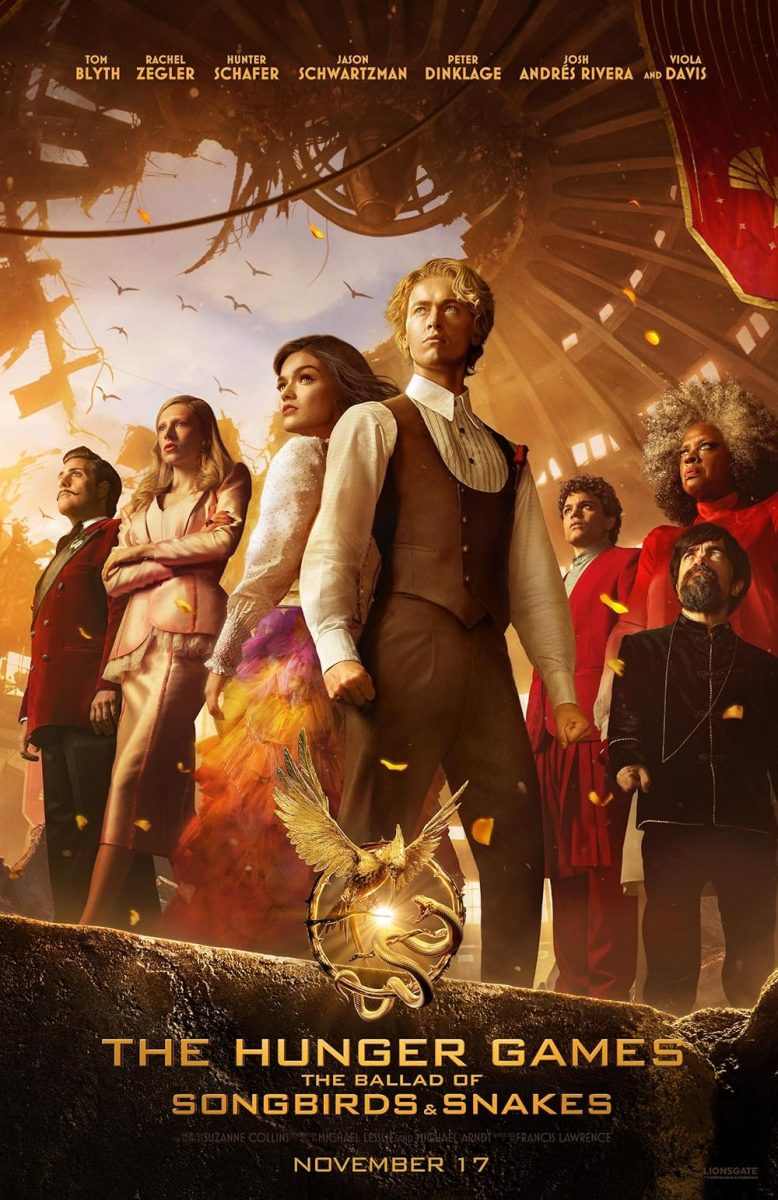The newest addition to ‘The Hunger Games’ franchise, The Hunger Games: The Ballad of Songbirds and Snakes, was released on November 17. The movie is a plot-driven, slow-burn prequel to the original franchise with a run time of two hours and 37 minutes. Directed by the same director as the franchise’s other four movies, Francis Lawrence, the movie was a box office hit with $11 Million over its premiere weekend.
The prequel explains the rise of Coriolanus Snow (Tom Blyth), the future President and tormentor of Panem. The movie is set post-war Capitol in the 10th annual Hunger Games–which is 64 years before Katniss Everdeen’s games in the franchise’s first movie.
The movie explores themes of power and loss of innocence, while adding dimension to the villainous character of President Snow. The movie begins by revealing Snow’s facade of wealth in the Capitol. Compared to others in the Capitol, he and his family are struggling financially.
The Hunger Games: The Ballad of Songbirds and Snakes highlights Snow’s slow but steady rise to obsession–obsession with power, status, and control. He strays away from his innocence so much that he grows frighteningly willing to harm loved ones to secure his future. Tom Blyth’s chilling acting performance of transforming from innocent to villainous makes the movie all the more unsettling to watch.
Although I was in my preteen years during The Hunger Games’ peak years I always enjoyed the movies. Some may say I was too young to be watching such violent scenes, but the series became a staple in my household. Out of the franchise, the first movie was replayed constantly because of how fast-paced and action packed it was. It was quick, easy, and brilliant entertainment.
As the series progressed the movies became less fast-paced as Francis Lawrence and the writers focused on the beginning of the revolution, which made worldbuilding and storytelling more crucial. Ironically, as I grew older I began to prefer slow-burn movies far more than the former.
There was less action in the prequel, and some viewers did not care for that. However, it was necessary to highlight how Snow’s sharp turn of character did not happen because of one event or over one night, but over many events and many years.
In comparison to the franchise’s previous movies, the prequel was seen as a risk by critics and some fans. Singing became a major plot point of the movie and the novel it was based on–and it was not enjoyed very much. Nevertheless, the decision made by Suzanne Collins, the series’ author, of adding singing as a key point in the series was genius. The singing ties the original movies in the franchise together, with the Mockingjays (bird) and the rebellion songs that both are significant symbols of the revolution.
The movie was reviewed with a 64% score by critics and an 89% by audience on Rotten Tomatoes. Top critics ultimately deem the movie as narratively uneven and lacking in comparison to the other movies in the franchise with casting, cinematography, dialogue, etc.
Most critics emphasize the lack of clarity. However, I believe that decision to be intentional by Suzanne Collins and Francis Lawrence. Lucy Gray became ‘unknown’ or had her existence ‘erased’ because of her history with President Snow. The lack of clarity throughout the movie highlights Snow’s attempts to forget Lucy Gray and his past, but he can not fully escape it all.
On the other hand, audience reviews are saying the opposite of critics. And as a long-time fan of the franchise, I truly enjoyed The Hunger Games: The Ballad of Songbirds and Snakes. After watching it on its premiere date, my sisters and I even re-watched the franchise in order over the weekend. The movie unintentionally created nostalgia worldwide; fans on social media shared they were re-watching the franchise as well because of the premiere.
The Hunger Games: The Ballad of Songbirds and Snakes was a well-done addition to the franchise as it built onto the world of the Capitol while successfully adding dimension to the villain, President Snow.
For non-Hunger Games fans, the movie can still be a good watch for many reasons. I highly recommend the movie to anyone because it can appeal to a variety of audiences. The movie reveals the impact of power and control on innocent individuals which can be related to modern day injustices, making the movie more necessary to watch. In addition, The Hunger Games: The Ballad of Songbirds and Snakes was a fantastic watch mixed with action, suspense, thriller, and a sprinkle of romance–what more to enjoy?




